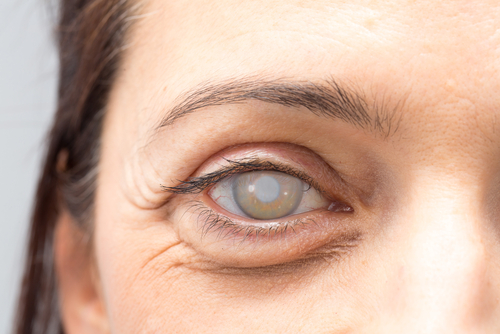
Page contents
What are cataracts?
Cataracts are a common eye condition in which the lens of the eye becomes cloudy, leading to blurred or hazy vision. This cloudiness occurs when proteins in the lens break down and clump together, scattering light and making it difficult for the eye to focus properly on the retina.
Cataracts tend to mostly be related to ageing. However they can also occur due to genetics, eye injuries, or certain medical conditions such as diabetes.
What are the key symptoms of cataracts?
- Blurred vision
- Cloudy vision
- Difficulty seeing at night,
- Increased sensitivity to light,
- Seeing halos around lights
What is the treatment for cataracts?
The only treatment for cataracts is surgery.
Laser surgery, eye drops and medication cannot cure and remove cataracts.
“Think of your eye as a camera. Just as a camera has a lens to focus light onto its sensor, your eye has a natural lens that focuses light onto your retina. This lens sits inside your eye like a Smartie in its shell.
“During surgery, the surgeon carefully breaks open the outer ‘shell’, scoops out the inner lens, and replaces it with an artificial one. It’s rather like upgrading your camera’s lens to take better pictures,” says Professor Sunil Shah, a Consultant Ophthalmic Surgeon at Midland Eye.
Cataracts are a bit like having a frosted window in your eye – the lens becomes cloudy, making everything look misty or blurred.
It’s an incredibly common condition as we age, affecting many people over 65.
“During cataract surgery, the cloudy lens is removed and replaced with a clear artificial one, helping restore your vision to its former clarity,” according to Professor Shah.
Is cataract surgery free?
Yes, cataract surgery is free on the NHS as long as the person meets the eligibility criteria.
If you decide to have surgery to have cataracts removed, you may have to go on a waiting list depending on what area you live in.
If the NHS is funding the surgery, you are likely to get monofocal lenses. These focus on one distance and tend to be for distance vision such as for driving. You are likely to still need reading glasses.
The surgery is usually done under local anaesthetic and you will be a day patient.
Paying privately for cataract surgery
If you end up being put on a long waiting list, you may want to go private so you can have your cataracts removed quickly as they can impact on your quality of life.
You may also want to have more of a choice of lens options than a monofocal lens.
You can also have something called Refractive Lens Exchange (RLE) to correct your vision before any cataracts occur.
If you have RLE, you can choose from Monofocal Lenses, Extended Depth of Focus (EDOF) Lenses, Multifocal Lenses and Toric Lenses: The Astigmatism Specialists
How much is private surgery for cataracts and RLE?
Cataract surgery with monofocal lenses typically costs between £2,000 and £4,000 per eye for private treatment. If you want a more advanced lens you will need to pay more.
Many private clinics offer payment plans, and private insurance policies should contribute to the cost of cataract surgery but not RLE.
Recovering from cataract surgery
Recovery is typically quick and straightforward. Most people notice clearer vision within a day, though there might be some variability in your vision during the first week.
You may have a gritty feeling in your eye. Full recovery will take 4-6 weeks.
Professor Shah of Midland Eye recommends that post-surgery you should:
- Take about a week off driving (or until you meet the legal vision requirements)
- Use eye drops for about a month
- Take a short time off work (usually less than a week, depending on your job)
- Avoid swimming or heavy lifting for a few weeks

